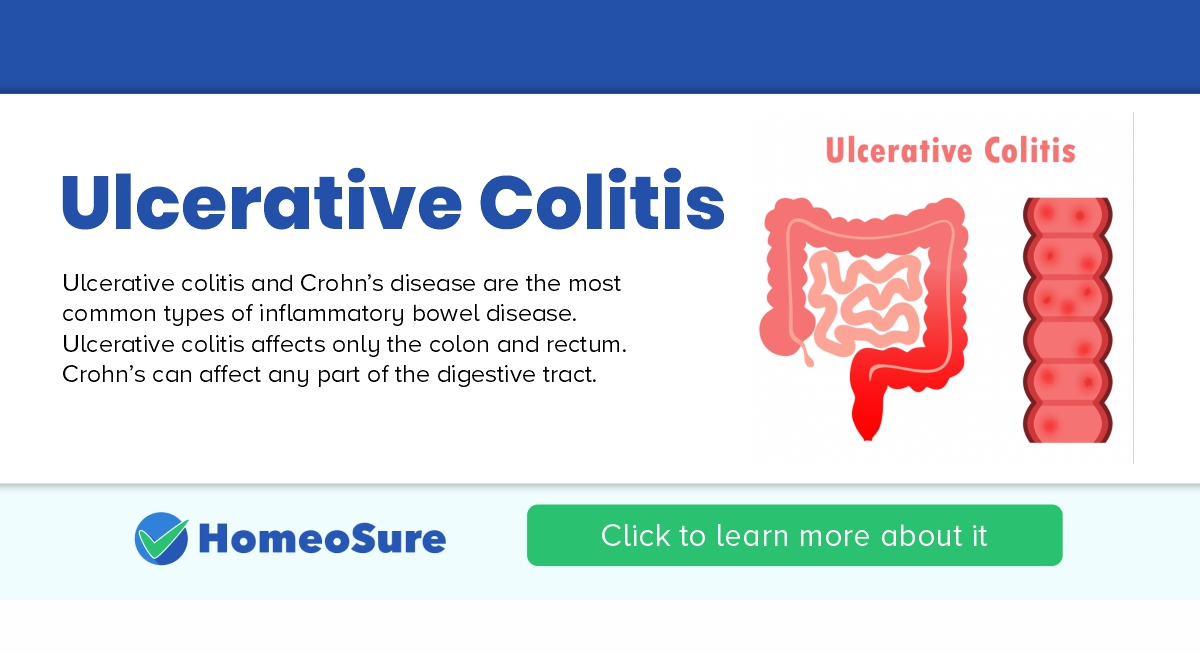Ulcerative Colitis
Ulcerative colitis and Crohn’s disease are the most common types of inflammatory bowel disease. Ulcerative colitis affects only the colon and rectum. Crohn’s can affect any part of the digestive tract.
Ulcerative colitis is a disease that causes inflammation and sores (ulcers) in the lining of the large intestine (colon). It usually affects the lower section (sigmoid colon) and the rectum. But it can affect the entire colon. In general, the more of the colon that’s affected, the worse the symptoms will be. The disease can affect people of any age. But most people who have it are diagnosed before the age of 30.
Experts aren’t sure what causes it. They think it might be caused by the immune system overreacting to normal bacteria in the digestive tract. Or other kinds of bacteria and viruses may cause it. You are more likely to get ulcerative colitis if other people in your family have it.
Ulcerative colitis is a global condition affecting people world over. About half of the people with IBD have ulcerative colitis; about half have Crohn’s disease.
The incidence of Ulcerative colitis has risen with the tide of civilization. Moreover this is a disease of young people having grievous impact on their education and career.
SYMPTOMS OF ULCERATIVE COLITIS
The main symptoms of ulcerative colitis are:
- Recurring diarrhoea, which may contain blood, mucus or pus
- Abdominal (tummy) pain
- Need to empty your bowels frequently
- Fatigue (extreme tiredness), loss of appetite and weight loss
- The severity of the symptoms varies, depending on how much of the rectum and colon is inflamed and how severe the inflammation is. For some people, the condition has a significant impact on their everyday lives.
- Symptoms of a flare-up
Some people may go for weeks or months with very mild symptoms, or none at all (known as remission), followed by periods where the symptoms are particularly troublesome (known as flare-ups or relapses). During a flare-up, some people with ulcerative colitis also experience symptoms elsewhere in their body.
For example, some people develop:
- Painful and swollen joints (arthritis)
- Mouth ulcers
- Areas of painful, red and swollen skin
- Irritated and red eyes
- In severe cases, defined as having to empty your bowels six or more times a day, additional symptoms may include:
- Blood in your stools becoming more obvious
- In most people, no specific trigger for flare-ups is identified, although a gut infection can occasionally be the cause. Stress is also thought to be a potential factor.
COMPLICATIONS
Major complications associated with Ulcerative Colitis are:
- Obstruction
- Perforation – Hole in the colon
- Inflammation in skin, eyes and joints
- Haemorrhage
- Sepsis – Severe infection which spreads through the bloodstream.
- Fistula
- Abscess
- Toxic Megacolon
DIAGNOSIS
- A stool sample can be checked for signs of infection, as gastroenteritis (infection of the stomach and bowel) can sometimes have similar symptoms to ulcerative colitis.
- X-ray or computerised tomography (CT) scan to rule out serious complications and a detailed examination of your rectum and colon
- Sigmoidoscopy
- Colonoscopy
HOMEOPATHIC TREATMENT
Ulcerative colitis is a chronic inflammatory bowel disorder, the cause of which points to the disturbances in the immune system. Homeopathy is the only system of medicine which treats the immune disorders in the most scientific and comprehensive manner.
Homeopathy will not only treat ulcerative colitis from its roots, but make sure that the underlying cause is well taken care of. Homeopathic Treatment In Ulcerative Colitis will give relief in:
- Symptoms of disease
- Prevent complications of disease
- Preventing relapse
Homeopathic treatment is targeted towards UPROOTING THE DISEASE and ensuring health with no side effects. For prescribing to an individual, a PLAN OF TREATMENT is followed which involves:
- GETTING THOROUGH UNDERSTANDING OF CASE which includes complete case taking (analyzing patient as an individual) along with patient history and family history
- DIAGNOSIS OF PATIENT AND DISEASE
- INDIVIDUAL ASSESSMENT OF THE CASE
- PRESCRIBING THE MOST SUITABLE INDIVIDUAL CONSTITUTIONAL REMEDY
